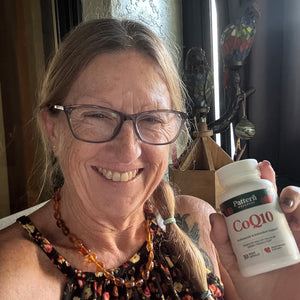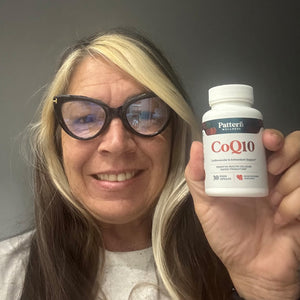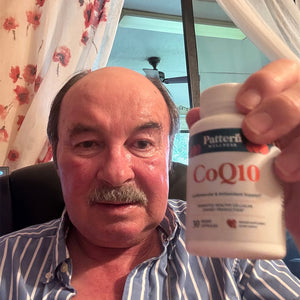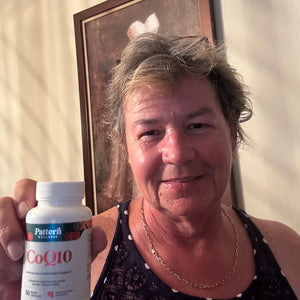${product.title}
${product_meta.subtitle}
- ${point}

Heart Health Support
With age, CoQ10 production decreases, increasing the risk for heart issues down the line. Research shows this essential nutrient is a cardiovascular booster, fighter, and protector that is jam-packed with optimum antioxidants.3,6,7,8

Energy Production Support
Oxidative stress can inhibit muscle function and endurance. Studies have shown that CoQ10 can decrease oxidative stress at a cellular level, increase energy capacity, and decrease fatigue.11,13,14,15

Nutrition for Vital Organs
The highest concentrations of CoQ10 are in organs like the heart, kidneys, and liver—some of the most susceptible to oxidative damage. Research shows CoQ10 can protect these vital organs from complications due to oxidative stress. 18,20,21
Natural Heart Wellness
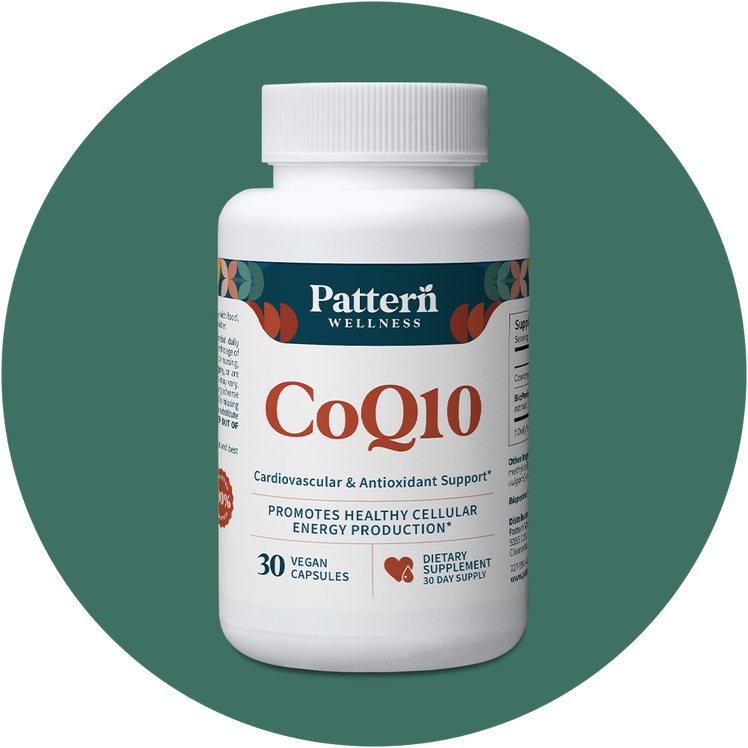
ANTIOXIDANT ENZYME BOOSTER
BENEFICIAL FOR STATIN USERS
ADVANCED MAXIMUM ABSORPTION
NO FILLERS OR BINDERS
3RD PARTY LAB TESTED
Risk-Free Purchase!
As Featured In..
- Han H. K. (2011). The effects of black pepper on the intestinal absorption and hepatic metabolism of drugs. Expert opinion on drug metabolism & toxicology, 7(6), 721–729. https://doi.org/10.1517/17425255.2011.570332
- Garrido-Maraver, J., Cordero, M. D., Oropesa-Avila, M., Vega, A. F., de la Mata, M., Pavon, A. D., Alcocer-Gomez, E., Calero, C. P., Paz, M. V., Alanis, M., de Lavera, I., Cotan, D., & Sanchez-Alcazar, J. A. (2014). Clinical applications of coenzyme Q10. Frontiers in bioscience (Landmark edition), 19(4), 619–633. https://doi.org/10.2741/4231
- Garrido-Maraver, J., Cordero, M. D., Oropesa-Ávila, M., Fernández Vega, A., de la Mata, M., Delgado Pavón, A., de Miguel, M., Pérez Calero, C., Villanueva Paz, M., Cotán, D., & Sánchez-Alcázar, J. A. (2014). Coenzyme q10 therapy. Molecular syndromology, 5(3-4), 187–197. https://doi.org/10.1159/000360101
- Doimo, M., Desbats, M. A., Cerqua, C., Cassina, M., Trevisson, E., & Salviati, L. (2014). Genetics of coenzyme q10 deficiency. Molecular syndromology, 5(3-4), 156–162. https://doi.org/10.1159/000362826
- Navarro-Yepes, J., Burns, M., Anandhan, A., Khalimonchuk, O., del Razo, L. M., Quintanilla-Vega, B., Pappa, A., Panayiotidis, M. I., & Franco, R. (2014). Oxidative stress, redox signaling, and autophagy: cell death versus survival. Antioxidants & redox signaling, 21(1), 66–85. https://doi.org/10.1089/ars.2014.5837
- Mortensen, S. A., Rosenfeldt, F., Kumar, A., Dolliner, P., Filipiak, K. J., Pella, D., Alehagen, U., Steurer, G., Littarru, G. P., & Q-SYMBIO Study Investigators (2014). The effect of coenzyme Q10 on morbidity and mortality in chronic heart failure: results from Q-SYMBIO: a randomized double-blind trial. JACC. Heart failure, 2(6), 641–649. https://doi.org/10.1016/j.jchf.2014.06.008
- Molyneux SL, Young JM, Florkowski CM, Lever M, George PM. Coenzyme Q10: is there a clinical role and a case for measurement? Clin Biochem Rev. 2008 May;29(2):71-82. PMID: 18787645; PMCID: PMC2533152. https://www.ncbi.nlm.nih.gov/pmc/articles/PMC2533152/
- DiNicolantonio, J. J., Bhutani, J., McCarty, M. F., & O'Keefe, J. H. (2015). Coenzyme Q10 for the treatment of heart failure: a review of the literature. Open heart, 2(1), e000326. https://doi.org/10.1136/openhrt-2015-000326
- Hoppe, U., Bergemann, J., Diembeck, W., Ennen, J., Gohla, S., Harris, I., Jacob, J., Kielholz, J., Mei, W., Pollet, D., Schachtschabel, D., Sauermann, G., Schreiner, V., Stäb, F., & Steckel, F. (1999). Coenzyme Q10, a cutaneous antioxidant and energizer. BioFactors (Oxford, England), 9(2-4), 371–378. https://doi.org/10.1002/biof.5520090238
- Hershey, A. D., Powers, S. W., Vockell, A. L., Lecates, S. L., Ellinor, P. L., Segers, A., Burdine, D., Manning, P., & Kabbouche, M. A. (2007). Coenzyme Q10 deficiency and response to supplementation in pediatric and adolescent migraine. Headache, 47(1), 73–80. https://doi.org/10.1111/j.1526-4610.2007.00652.x
- Gül, I., Gökbel, H., Belviranli, M., Okudan, N., Büyükbaş, S., & Başarali, K. (2011). Oxidative stress and antioxidant defense in plasma after repeated bouts of supramaximal exercise: the effect of coenzyme Q10. The Journal of sports medicine and physical fitness, 51(2), 305–312. https://pubmed.ncbi.nlm.nih.gov/21681167/
- Glover, E. I., Martin, J., Maher, A., Thornhill, R. E., Moran, G. R., & Tarnopolsky, M. A. (2010). A randomized trial of coenzyme Q10 in mitochondrial disorders. Muscle & nerve, 42(5), 739–748. https://doi.org/10.1002/mus.21758
- Gökbel, H., Gül, I., Belviranl, M., & Okudan, N. (2010). The effects of coenzyme Q10 supplementation on performance during repeated bouts of supramaximal exercise in sedentary men. Journal of strength and conditioning research, 24(1), 97–102. https://doi.org/10.1519/JSC.0b013e3181a61a50
- Cooke, M., Iosia, M., Buford, T., Shelmadine, B., Hudson, G., Kerksick, C., Rasmussen, C., Greenwood, M., Leutholtz, B., Willoughby, D., & Kreider, R. (2008). Effects of acute and 14-day coenzyme Q10 supplementation on exercise performance in both trained and untrained individuals. Journal of the International Society of Sports Nutrition, 5, 8. https://doi.org/10.1186/1550-2783-5-8
- Ghiasvand, R. and Hariri, M. (2016). Muscle and oxidative stress. In Oxidative Stress and Antioxidant Protection (eds D. Armstrong and R.D. Stratton). https://doi.org/10.1002/9781118832431.ch14
- Folkers, K., Osterborg, A., Nylander, M., Morita, M., & Mellstedt, H. (1997). Activities of vitamin Q10 in animal models and a serious deficiency in patients with cancer. Biochemical and biophysical research communications, 234(2), 296–299. https://doi.org/10.1006/bbrc.1997.6522
- Wadsworth, T. L., Bishop, J. A., Pappu, A. S., Woltjer, R. L., & Quinn, J. F. (2008). Evaluation of coenzyme Q as an antioxidant strategy for Alzheimer's disease. Journal of Alzheimer's disease : JAD, 14(2), 225–234. https://doi.org/10.3233/jad-2008-14210
- Shults, C. W., Oakes, D., Kieburtz, K., Beal, M. F., Haas, R., Plumb, S., Juncos, J. L., Nutt, J., Shoulson, I., Carter, J., Kompoliti, K., Perlmutter, J. S., Reich, S., Stern, M., Watts, R. L., Kurlan, R., Molho, E., Harrison, M., Lew, M., & Parkinson Study Group (2002). Effects of coenzyme Q10 in early Parkinson disease: evidence of slowing of the functional decline. Archives of neurology, 59(10), 1541–1550. https://doi.org/10.1001/archneur.59.10.1541
- Gvozdjáková, A., Kucharská, J., Bartkovjaková, M., Gazdíková, K., & Gazdík, F. E. (2005). Coenzyme Q10 supplementation reduces corticosteroids dosage in patients with bronchial asthma. BioFactors (Oxford, England), 25(1-4), 235–240. https://doi.org/10.1002/biof.5520250129
- Fujimoto, S., Kurihara, N., Hirata, K., & Takeda, T. (1993). Effects of coenzyme Q10 administration on pulmonary function and exercise performance in patients with chronic lung diseases. The Clinical investigator, 71(8 Suppl), S162–S166. https://doi.org/10.1007/BF00226860
- Marappan, G. (2020). Coenzyme Q10: Regulators of Mitochondria and beyond. In V. Y. Waisundara, & M. Z. Jovandaric (Eds.), Apolipoproteins, Triglycerides and Cholesterol. IntechOpen. https://doi.org/10.5772/intechopen.89496
- Deichmann, R., Lavie, C., & Andrews, S. (2010). Coenzyme q10 and statin-induced mitochondrial dysfunction. The Ochsner journal, 10(1), 16–21. https://www.ncbi.nlm.nih.gov/pmc/articles/PMC3096178/
- Littlefield, N., Beckstrand, R. L., & Luthy, K. E. (2014). Statins' effect on plasma levels of Coenzyme Q10 and improvement in myopathy with supplementation. Journal of the American Association of Nurse Practitioners, 26(2), 85–90. https://doi.org/10.1002/2327-6924.12046
- Akarsu S, Gode F, Isik AZ, Dikmen ZG, Tekindal MA. The association between coenzyme Q10 concentrations in follicular fluid with embryo morphokinetics and pregnancy rate in assisted reproductive techniques. J Assist Reprod Genet. 2017 May;34(5):599-605. doi: 10.1007/s10815-017-0882-x. Epub 2017 Feb 9. Erratum in: J Assist Reprod Genet. 2017 May;34(5):607. PMID: 28185121; PMCID: PMC5427661. https://pubmed.ncbi.nlm.nih.gov/28185121/
- Price G, Patel DA. Drug Bioavailability. [Updated 2022 Jun 23]. In: StatPearls [Internet]. Treasure Island (FL): StatPearls Publishing; 2023 Jan-. Available from: https://www.ncbi.nlm.nih.gov/books/NBK557852/
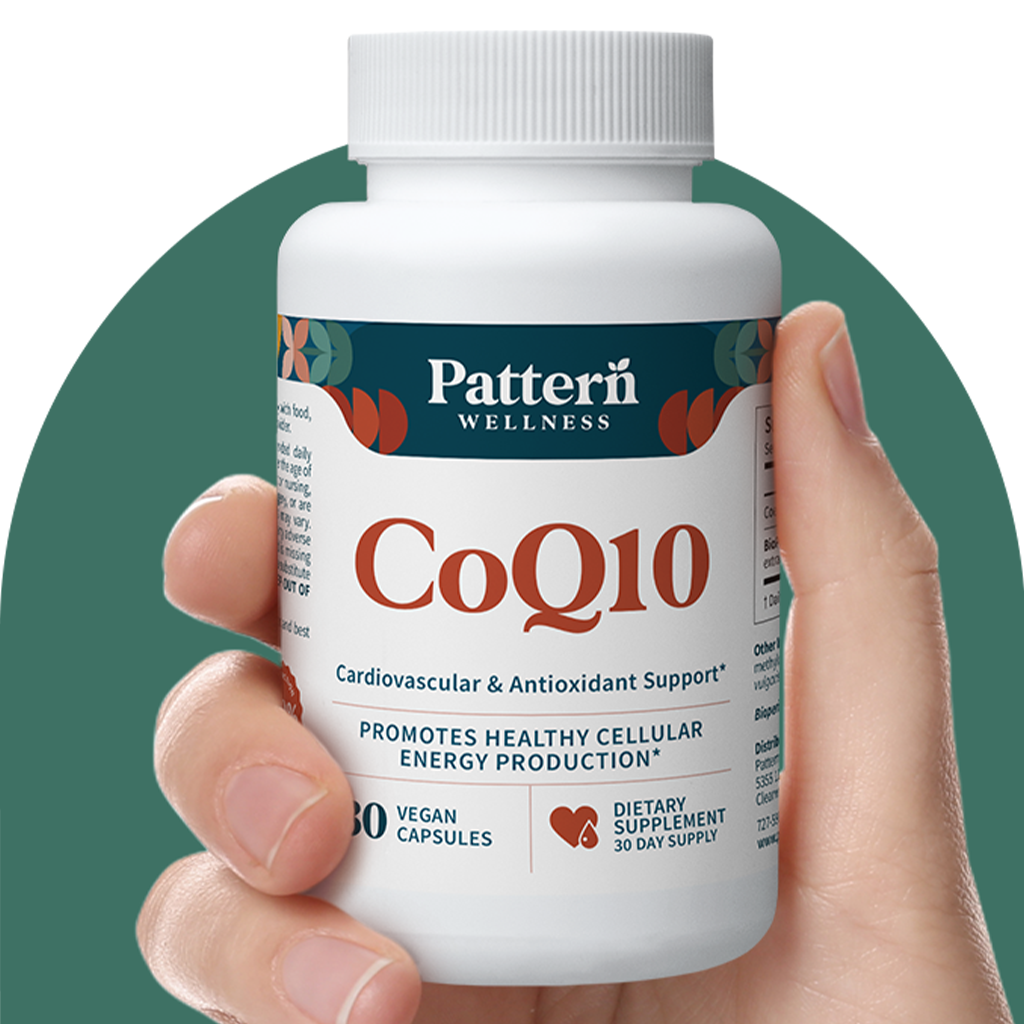
Frequently Asked Questions
HOW DO I TAKE THIS SUPPLEMENT, AND HOW OFTEN SHOULD I USE IT?
Adults should take 1 capsule daily with or after a meal. For best results, take consistently as part of your daily wellness routine. While research suggests that CoQ10 is generally safe for long-term use at the recommended dosage, it is important to consult your doctor regarding your individual needs and any concerns about prolonged use.
WHAT IS UBIQUINONE?
Ubiquinone is the most researched and widely used form of CoQ10 (Coenzyme Q10), a powerful antioxidant naturally found in the body. It plays a key role in cellular energy production, especially in the heart, brain, and muscles. As we age, our natural CoQ10 levels decline—supplementing with ubiquinone can help restore and support those levels for overall wellness. 3-23
WHAT IS BIOPERINE®?
- BioPerine® is a patented black pepper extract that enhances nutrient absorption. Research shows it has the potential to increase the bioavailability of vitamins and minerals by up to 2,000%, helping your body make the most of every dose. 1,2,24,25
- BioPerine® is a registered trademark of the Sabinsa Corporation.
WHO IS THIS SUPPLEMENT BEST SUITED FOR?
This supplement is intended for adults ages 18 and up looking to support their overall wellness. Whether you’re starting fresh or enhancing your routine, it’s a powerful addition to your health journey!
IS THIS SUPPLEMENT SAFE FOR ALL DIETS OR DIETARY RESTRICTIONS?
Our CoQ10 is vegan, non-GMO, and free from gluten, soy, and dairy, making it an excellent choice for most diets and dietary restrictions. It's also GMP certified for quality assurance. If you have specific dietary concerns, we recommend consulting with your healthcare provider.
ARE THERE ANY POSSIBLE SIDE EFFECTS? CAN I TAKE THIS IF I’M PREGNANT, NURSING, HAVE A HEALTH CONDITION, OR TAKING MEDICATION?
Individual reactions to CoQ10 supplements may vary. While some people may experience mild side effects, it’s important to consult your physician if you have concerns, are pregnant or nursing, have a health condition, or are taking medication. Your healthcare provider can help determine if CoQ10 is appropriate for you.
WHEN CAN I EXPECT TO SEE RESULTS?
Every body is different, so the time it takes to notice results can vary from person to person. Typically, results may be noticeable within 4–8 weeks of consistent use. Supplements work best when taken regularly and paired with a balanced diet, movement, and other healthy lifestyle habits. While everyone's experience is unique, consistency is key.
HOW SHOULD I STORE THIS SUPPLEMENT?
CoQ10 capsules should be stored away from direct sunlight, humidity, and moisture. Make sure that the jar lid is fully sealed after each use.
WHAT IF I’M NOT SATISFIED WITH MY PURCHASE?
If you’re not satisfied with your purchase, we offer a simple, 100% Satisfaction Guarantee. Love it, or your money back!
Don't just take our word for it...
Thousands of people love this product - find out why!
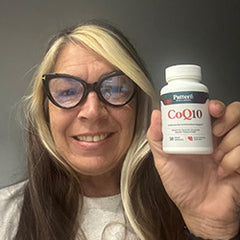
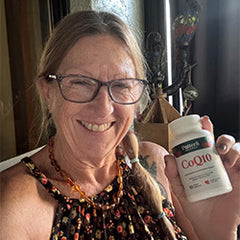

Heart Strong, Energy Boosted
Experience the Benefits of Our CoQ10
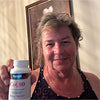
“I’ve noticed a difference in my energy, and even my blood pressure’s been more stable. Really glad I gave this a try.”
Diana K.
